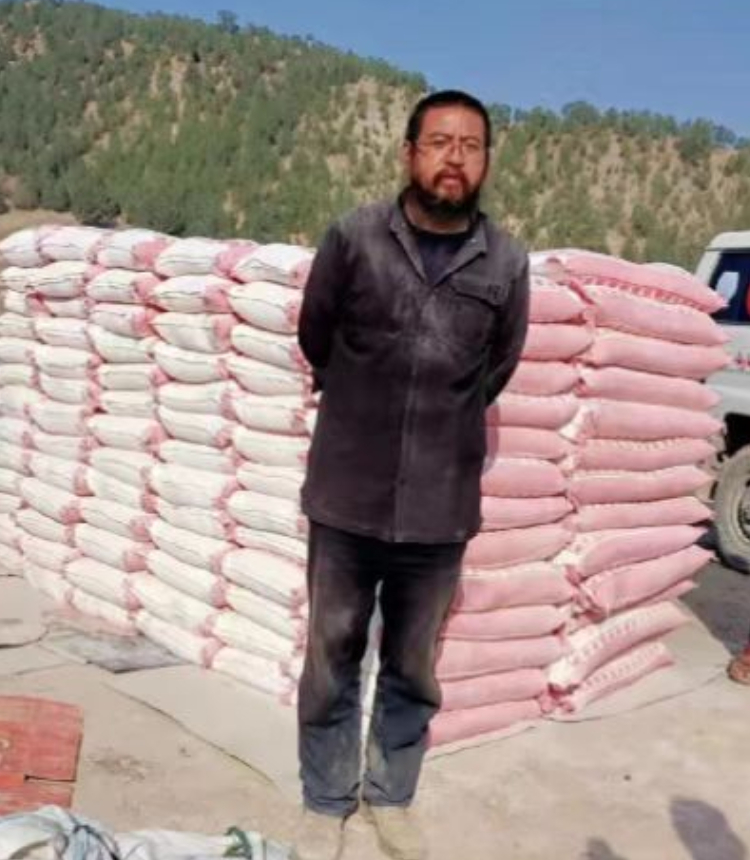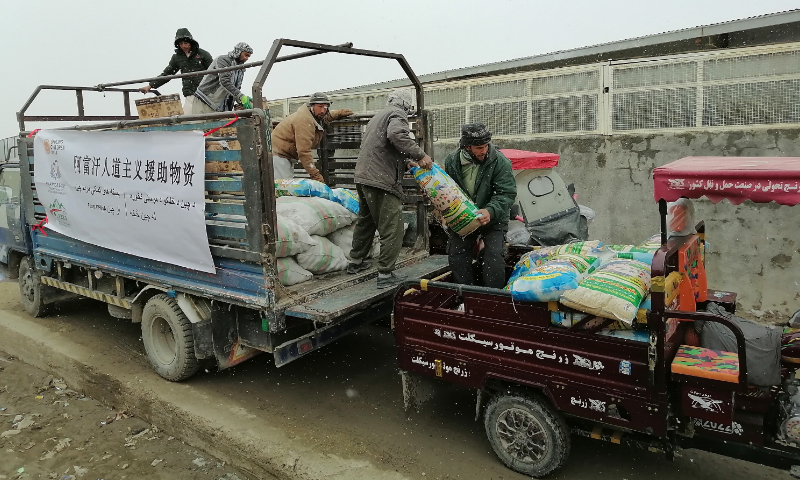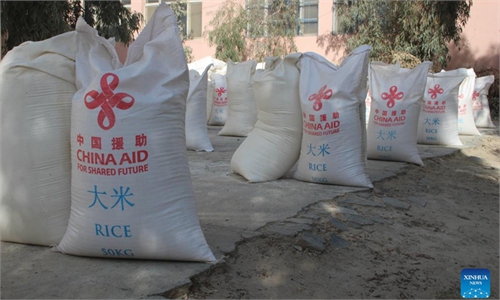IN-DEPTH / IN-DEPTH
'I have been face to face with terrorists:' Chinese scholar shares thrilling moments in Afghanistan

Wang Duanyong donates supplies to victims of the Afghanistan earthquake in June 2022. Photo: Courtesy of Wang
On February 13, the Chinese embassy in Afghanistan issued a message stating that the security situation in Afghanistan is becoming more serious and complex, and reminding Chinese nationals not to travel to Afghanistan in recent days. The reminder came after a bomb-and-gun attack on December 12, 2022, targeting a hotel in Afghanistan's capital, which saw at least three assailants killed and five Chinese nationals wounded among others.
After the incident, the embassy urged Chinese nationals and institutions in Afghanistan to exercise more care with regard to their safety and leave the country as soon as possible if their presence in the country was not necessary.
On January 21, China's Foreign Minister Qin Gang held a phone conversation with Amir Khan Muttaqi, acting foreign minister of the Afghan interim government, stressing that China hoped the Afghan side would take strong measures to ensure the safety of Chinese personnel and institutions in Afghanistan.
What is the current situation in Afghanistan? What security risks do Chinese nationals face while in the country? The Global Times recently spoke with Wang Duanyong, an associate researcher at the School of International Relations and Public Affairs at Shanghai International Studies University, who conducted a long investigation in Afghanistan and experienced the hotel attack firsthand. Wang shared his experience and observations over the last year.
'I could have been the first one to get shot.'
GT: The previous bomb-and-gun attack targeting a hotel and injuring five Chinese nationals was shocking. What are the heart-stopping moments that you can still recall?
Wang: I was on the sixth floor of the hotel on the day, and the attack started on the seventh floor. At 2: 08 pm on December 12, I suddenly heard two loud bangs from upstairs. I opened the door and made eye contact with a young man who appeared to be a local coming down from the seventh floor. That was the moment another loud bang suddenly happened upstairs, and then he stopped, pulled a pistol out of a small bag under his arm, turned, and walked back to the seventh floor.
I think he was one of the attackers who were meant to come downstairs to hunt people down. He must have seen me then. If there hadn't been a sudden bang upstairs, I would have been the first target.
The whole attack lasted for about two hours, and several fires were set in the building. In addition to the gunfight, there were multiple explosions, and the most violent was heard in the room next to me.
Hotel security personnel were the first to stand up to the terrorists. After about 20 minutes, Taliban reinforcements arrived. The furious gunfight and explosions lasted for about 40-45 minutes.
The attackers set fire to a room on the fifth floor, and smoke immediately came up and engulfed the floors above. I choked on the smoke and had to open the window again, and I saw a shocking scene: A Chinese girl was hanging outside the balcony of a seventh-floor apartment from which I think she meant to escape through the balcony.
With a quick sudden loud explosion and a lot of flying debri, the panic-stricken girl fell straight down amid the bombing sound.
This scene was particularly heart-trenching for me. She was fortunately rescued soon after and is now in recovering.
Two hours later, I was finally freed. One of the Taliban soldiers showed me a photo taken just at the scene of what was left of a terrorist suicide bomber - a head and an arm, the rest of the body was missing.
Many survivors have developed PTSD
GT: Why do you think there are terrorist attacks on Chinese nationals?
Wang: The extremist group Islamic State (IS)-Khorasan claimed responsibility for the attack. I guess that as a bitter rival, the IS will of course employ any means to undermine the Taliban's rule, including damaging the investment climate and confidence in Afghanistan. This time they set the target on the most important foreign group in Afghanistan — the Chinese.
These terrorist groups receive support from some international forces, so the attack cannot be ruled out as being done by a third party. But no matter who instigated it, Chinese nationals are innocent victims, and it has seriously undermined the peace and reconstruction process in Afghanistan, a disaster-ridden country.
After the terrorist attack, many Chinese survivors began to exhibit relatively obvious symptoms of post-traumatic stress disorder (PTSD). For example, in the days immediately after the accident, everyone was nervous at the slightest noise. After we moved to a safe hotel, we didn't dare ring the doorbell or knock on each other's doors, but can only communicate via text messages.
Some survivors returning to China couldn't even sleep all night on Chinese New Year's Eve because of firecrackers. It is difficult to imagine how we were dealing with fear even after around one or half month after the terrorist attack.
GT: What assistance and support did the Chinese Embassy provide after the terrorist attack?
Wang: The embassy got in touch with us immediately after the attack. I remember that only about 10 minutes after the first shot was fired, I got a call from a senior diplomat at the Chinese Embassy. He asked about the situation in the building and told me that they had contacted the local military and police and that reinforcement was on their way. They also came soon after the call as the gunfire kept going.
The embassy staff then followed the whole rescue process, coming to the hospital several times.
The girl who fell and sustained serious injuries strongly wished to return to China for further treatment, so the embassy tried their best to coordinate various channels in the shortest possible time to assist and safely send her back to China. The difficulties meant to be overcome in this process are far beyond ordinary people's imagination.
On the second day after the incident, the Chinese Ambassador to Afghanistan personally led a team to the hospital where injured Chinese nationals were recuperating to check on their injuries and discuss treatment plans with the hospital.
A group of six Chinese Embassy staff members including the ambassador donated blood at the hospital.
They also gave the medical staff small New Year gifts to thank them and encourage them for helping Chinese nationals, the details of which were both unexpected and warm.
On the night of the terrorist attack, many local Chinese nationals came to the hospital to donate blood, money, and to volunteer to look after the wounded. The number of volunteers far exceeded our expectations.
Chinese security risks increasing
GT: At present, how is the safety situation for Chinese nationals in Afghanistan?
Wang: In fact, as early as August 2021 before the Taliban takeover of Kabul again, the vast majority of Chinese nationals returned to China under the encouragement and supports of the Chinese Embassy. After the attacks, only a few stayed.
The security risks faced by Chinese nationals are still increasing. Security in Afghanistan also remains as a concern. The occasional detainment and search on Chinese nationals is also a source of insecurity to us.
GT: In general, how do you view the Taliban's performance in power over the last year and a half?
Wang: The Taliban now still enforces some obviously controversial policies and measures, such as the recent announcement by the Taliban education authority that women will be suspended from taking university entrance exams.
But they have also done certain things better than expected. A World Bank report released on January 25 offers surprisingly high praise for the Afghan economy's performance in 2022, citing high exports, a stable exchange rate, and strong tax revenues.
Based on my observations, the Afghan currency has been remarkably stable against the dollar for most of the year and a half since the Taliban returned to power, especially after February 2022. One of the main reasons for this is that the international community has never been absent from supporting the country.

The latest batch of aided supplies provided by Chinese NGOs to Afghan students in harsh winter. Photo: Courtesy of Wang Duanyong
Chinese aids always there
GT: A harsh winter continues to fuel ongoing humanitarian crises in Afghanistan, threatening those still struggling in poverty. According to your observation, how serious is the current humanitarian crisis in Afghanistan?
Wang: Afghanistan has seen one of the world's worst humanitarian crises in years. Over the last year and a half, the humanitarian crisis has become even more serious as foreign aid has been drastically reduced, while military fire and terrorist attacks have become an occasional occurrence.
When I came here, I found out that, different from our initial imagination, basic living supplies such as food, cloths, and fuel are not in a serious shortage, at least in major cities across the country. The real trouble is that most people do not have purchasing power, which is heavily manipulated in the country's dire economic situation and political turmoil.
At present, our non-profit charity Friends of Hindu Kush Organization (FHKO), which is registered in Afghanistan, continues to provide donations to the vulnerable in Afghanistan. The latest batch of food aid arrived on January 7 at two welfare schools in the central Afghan city of Ghazni, providing two months-worth of winter rations for 320 primary and secondary school students.


